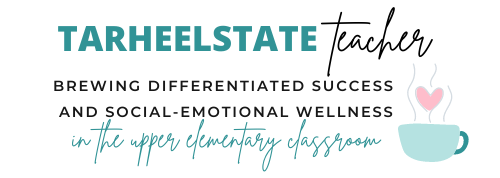Launching Morning Meeting at the Beginning of the Year (or anytime!)

All it really takes to introduce a community meeting theme {and get it posted on your wall for students to reference} is one short read aloud and discussion session with your students. Read on to learn how I introduce our community meeting themes at the beginning of the year to set the foundation for more in-depth community meeting theme units later in the year.
Need to catch up?
Other Posts in this Series: Introduction to the Series
→ Post 1: Why I Devote Time to Classroom Meetings
→ Post 2: The Design: An Overview
→ Post 3: Why a Theme-Based Morning Meeting?
→ Post 4: Morning Meeting: Materials and Resources
→ Post 5: Launching Morning Meeting at the BOY
→ Post 6: Day by Day in the Morning Meeting
→ Post 7: Scheduling Classroom Meetings
→ Post 8: I Still Can't Fit it all In: Finding time for Morning Meetings
→ Post 9: A Structure for Solving Classroom Problems During Morning Meetings
→ Post 10: Justifying Your Morning Meetings (with the standards!)

During our first few weeks of school, I quickly introduce one of our class meeting themes each day by reading aloud my touchstone picturebook for each theme during a mini-community meeting. I display the theme on our community themes bulletin board and I highlight important vocabulary during these quick introductory lessons.
This process takes 30-45 minutes depending on how deep the discussion goes, the length of the picture book, and whether or not I ask students to jot down a response in their notebooks. During these lessons, students will also begin setting up their morning meeting journals with the cover-pages for each theme, saving some space in between each to add journal pages and reflections later. I described my community meeting journals last week in my 4th post about Materials and Resources.
Exposing students to our most important themes quickly at the beginning of the year allows me to have critical conversations with them and allows me to begin establishing my classroom community and classroom meeting routines.
By the end of the first two or three weeks of school, I have exposed students to our ten themes, some awesome picture books, and set a foundation for the rest of the year. You may also choose to just introduce the first set of five themes {Belonging, Kindness, Compassion, Conflict, and Perseverance} and implement the next 5 themes when you are ready for more...With a quick introduction to each theme, we are now ready to dig deeper! You can read a full description of how I introduce my belonging theme on the first day of school.

After themes have been briefly introduced, I spend at least one week taking students on an in-depth journey through each theme during a {daily} 15-20 minute chunk of time set aside for community meetings.
Depending on my students’ personal needs and the questions that arise as we discuss specific themes together, we may spend more than one week on a theme or spiral back to it later in the year.
Keep in mind that the best community lessons and discussions are those that respond to the needs and personalities of your current students.
I feel like the themes I touch on during the first few weeks of school--kindness, belonging, dealing with conflict, compassion, and perseverance--really stick with students.
Community Meeting as a Mini-Unit in Reader's Workshop
Because of the impact community meeting theme units have made on my students in the past, this year I decided to devote more time to my community meeting themes at the beginning of the year by jumping in head first and using my belonging theme unit as my initial reader's workshop minilessons for the first month of school.
While we have of course set up our reading workshop, learned to choose books, begun independent reading, and started individual conferences about our reading, choosing to use my belonging unit during reader’s workshop for just a few weeks has helped me ensure that I have set aside the time to implement my community meetings well AND that I have built a classroom community where students know that belonging and kindness are important.
We just wrapped up the third week of school and I've found that I've been able to enjoy the themes even more as I take my students’ thinking deeper, especially with more time to compare and contrast different stories and grow big ideas. Recall that one of my favorite things about a theme-based community meeting is how it also helps me meet the standards--we've already hit theme, making connections, summarizing, character analysis, analyzed how different authors write about the same theme, and generated analyses and written responses to quotations.
Although I used my belonging unit during reader's workshop, I still introduced one morning meeting theme each day. The Day 1-Day 10 graphic above shows the read alouds that I used to introduce each theme.
What Did I do for My Belonging Mini-Unit?
My theme-based sets for morning meetings contain a teacher resource page that includes key questions, a list of 5 or more read alouds for each theme, and at least 5 suggested activities. I've also developed student journal pages that contain self-assessments, class discussion prompts, quotation and read aloud responses, comparing/contrasting charts, and more. I used the teacher resource sheet from my Belonging theme set to plan my lessons. You can read a detailed lesson plan for my my belonging theme unit and my compassion-themed morning meeting lessons.
You can also check out a detailed overview of my theme-based community meeting materials in my post about how I came up with my theme-based community meeting idea and designed the materials. The teacher lesson plans student journal pages, and bulletin board materials for my "belonging" themed morning meeting lessons are freebies on teacherspayteachers. Make sure to grab BOTH downloads!
Next week's post is all about the day-by-day in morning meetings.
SHOP THE RESOURCES:

